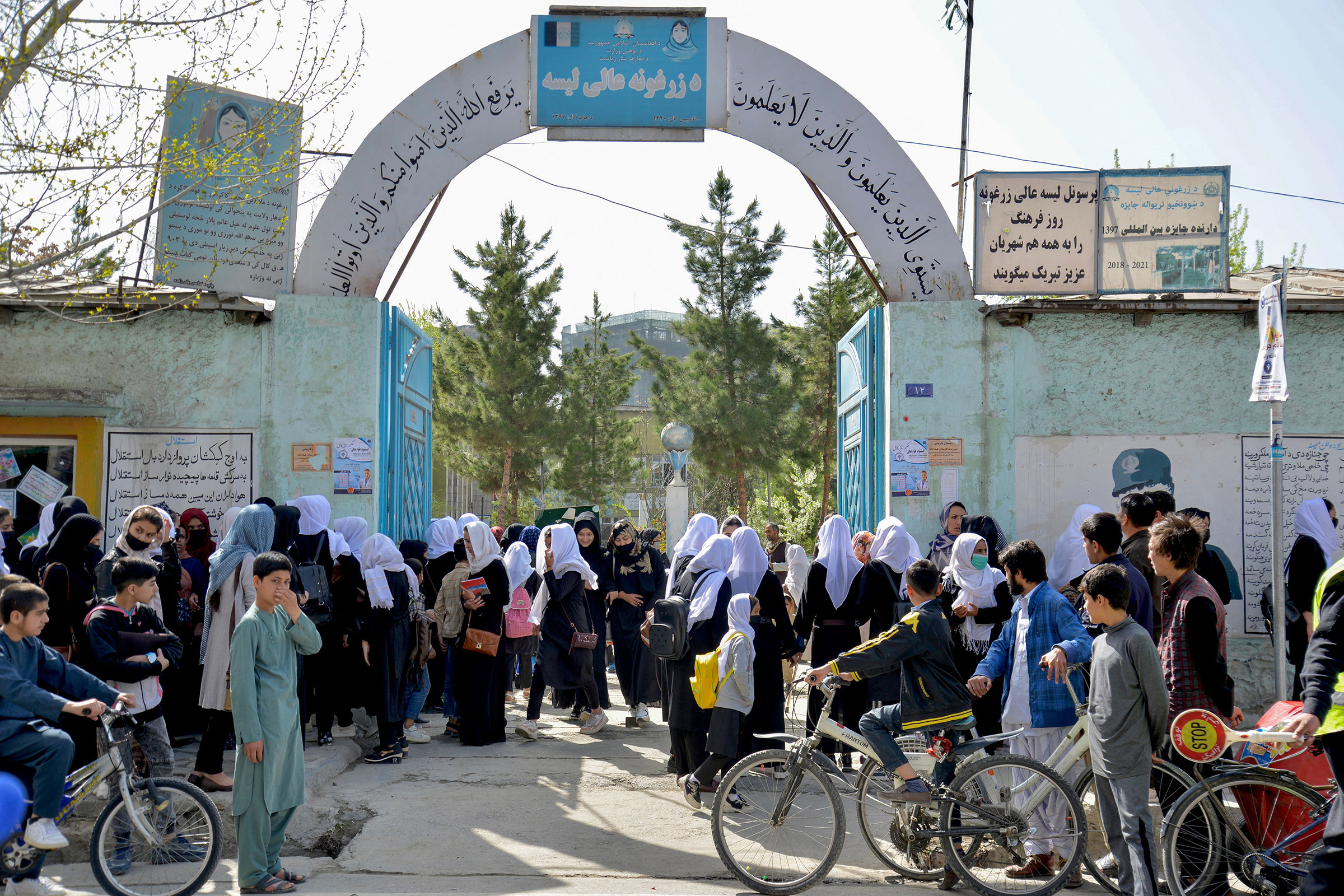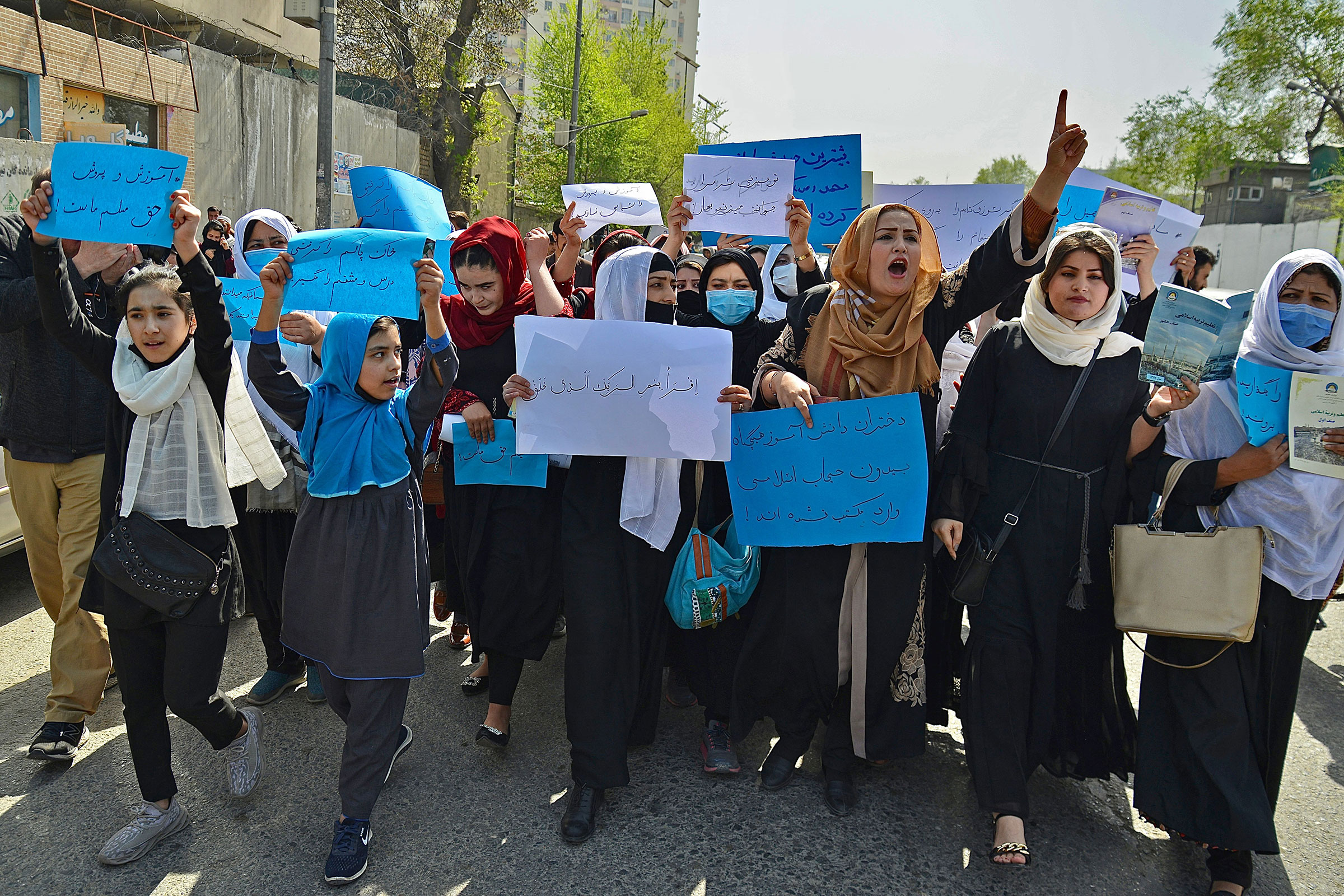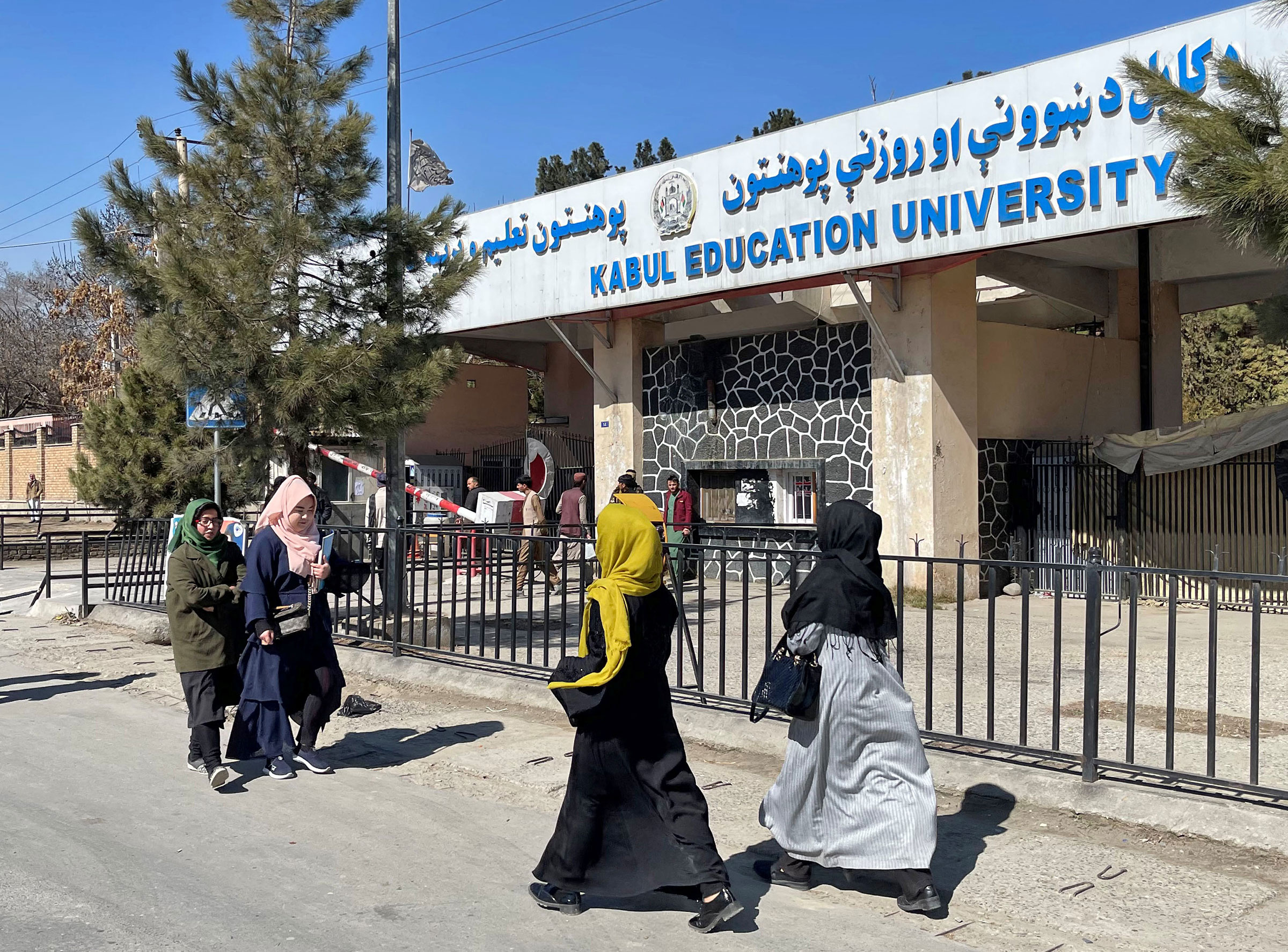
Almost one week has passed since the Taliban reneged on its promise to reopen schools for girls from the sixth grade. The international community has sharply condemned the Taliban for the U-turn, and teenage girls have taken to the streets of the Afghan capital in protest, demanding a right to education.
On March 23, hundreds of thousands of adolescent girls across Afghanistan headed back to school after more than 180 days away, their backpacks full and books tucked under their arms. But they were turned away at the gates. Videos of Afghan schoolgirls sobbing in front of their schools have gone viral. A male TV presenter on the popular Tolo channel struggled to hold back tears when talking about the issue.
Read More: What Afghanistan’s Women Stand to Lose
After the Taliban swept back to power last August, the group banned most girls aged 12 and above from attending school. The Taliban had since said they could return to school in the Persian New Year, or Nowruz.

Women’s rights campaigners say the ban on girls’ education will only exacerbate Afghanistan’s dire economic situation. More than 1 million children under the age of five are acutely malnourished, according to UNICEF. More than half of the country’s population, some 24 million Afghans, are in need of “vital” humanitarian aid, according to the U.N.’s refugee agency.
The Taliban’s reversal on schools, seen as a bid to appease hard-liners within its ranks, will likely disrupt its efforts to win recognition from international donors. (Given the humanitarian crisis, the U.N. agreed to pay the salaries of school teachers—though that did not seem to be enough to convince the Taliban to keep to its word.)
Read More: Zahra Joya Fled the Taliban. She’s Still Telling the Stories of Afghan Women
Taliban edicts on education have been erratic and not uniformly implemented. Universities are operating in most of the country for both women and men, though classes have been divided according to gender. Private high schools for girls in the Afghan capital have been allowed to operate uninterrupted.
“We don’t say [schools] will be closed forever,” Waheedullah Hashmi, external relations and donor representative with the Taliban-led administration, told the Associated Press on March 24.

The sudden reversal on girls’ education comes amid a slew of new measures by the Taliban that further restricts women’s rights across the country—and echo prohibitions from the last time the group ruled, in the 1990s. On March 27, the group issued an edict on leisure time, enforcing gender segregation in public places such as parks—meaning families could no longer picnic together. Women have also been banned from traveling without a mahram, or a male relative.
TIME spoke to six women and girls affected by the backslide on education across the country. Many of the women featured asked TIME to withhold their last names for security reasons; others have requested full anonymity.
Marjan, 11, Kabul
Being a sixth grader, Marjan is legally allowed to go to school, since education for girls stops at grade 7 and above. But she has decided to stay home anyway, in solidarity with her two older sisters. Her dream is to one day become a doctor.
“I am terrified and sad. I’m not sure why the Taliban refused to allow my sisters to study. Is gaining knowledge a sin?
What happens next? Will I start university right away? Or is there nothing after sixth grade?”
Sawa, 16, Mazar-i-Sharif
Sawa, who describes herself as a feminist, comes from a large educated family. Both of her parents attended university. Originally from Kunduz in the north of the country, the family fled Taliban violence in 2015 and relocated to Mazar-i-Sharif.
“A little bit of me has died each day since the Taliban said we cannot go back to school. My heart is heavy and I cannot sleep at night. What the Taliban are doing to us is evil, inhuman, and stupid.
Our leaders prioritized their own interests over our lives. Now the Taliban are erasing us from society. I ask world leaders, ‘If you let us down this time, you will let millions down. Would you stay silent if the same thing happened to your daughters?’”
Zarghuna*, 18, Samangan
Zarghuna, whose name has been changed, graduated from high school in the northern province of Samangan and was hoping to begin university soon. But women in her province have not been allowed into university if they were not already studying when the Taliban took over the country in August 2021.
On March 23, Zarghuna helped her two younger sisters get dressed and ready to return to school.
“We were all so happy that day and sent them off to school. But then the calls started to come in. Each one said, ‘They won’t let us in and we don’t know what to do.’ Even my two brothers, in second and ninth grade, were in shock. They told me ‘Our poor sisters are not allowed to enter their classrooms’.
I can see that women in other Muslim countries, like Iraq and Pakistan, are able to study. But for some reason we are the only nation in the world where girls are gradually being denied an education.”
Aziza, 22, Kunduz
Aziza is studying for her psychology degree at university in the northern province in Kunduz, where local Taliban officials permit this. She plans to become a school teacher after graduating, but is not sure how she will do this without having a mahram, or a male relative chaperone, as her father is dead. Local Taliban officials enforce this rule in her province.
“[My family] was among the millions who sacrificed and scrimped and saved to send their daughters to school. Now I don’t know if I will ever be able to repay them for what they did for me all these years. I’ve seen fathers work so hard in order to send their boys and girls to school and make something of themselves, to not be dependent on others. Now that’s all gone.
The Taliban say we will become badly behaved if we study past sixth grade. Look at me, I’m 22, I completed my studies and I’m in college. Have I become ill-mannered? Have I lost my morals by studying? It’s all so preposterous and idiotic.
The peace that America, the international community, and the Taliban talk about is killing our souls and dreams. The world needs to take action and pressure the Taliban to open schools. If we do not stop the Taliban now, everything we worked for will vanish in the blink of an eye. In a single day these people set us back 20 years.”
Pari*, 23, Laghman
Pari, whose name has been changed, is an elementary school teacher in the eastern province of Laghman. She was happy that her younger sister was returning to school. On March 23, she was due to enter the ninth grade. Instead, Pari had to dry her tears.
“My sister kept saying over and over again, ‘What will my future be? What will become of me?’ Elders in the province have been meeting with the Taliban to urge them to reopen the schools, but so far there has been no progress. People here can’t do anything, we’re just trying to survive. The pressure has to come from the outside. [The international community] has to sit with the Taliban and make them change their ways, that’s the only thing that will help.”
Motarma, 60, Mazar-i-Sharif
Motarma, herself illiterate, has been trying to console her two granddaughters. The girls were set to enter the sixth and tenth grades.
“I never wanted my granddaughters to go through what I did. I know the pain of illiteracy, and now I’m afraid that they, too, will have to go into a world where they can’t even read the signs outside a doctor’s office.
I look at other women my age, who worked and studied because their families supported them and allowed them to flourish. All I can think is, ‘How is it that I can’t even manage the most basic things, but these women were able to work and provide for their families?’
The way that the Taliban hurt the teenage girls in Afghanistan on Wednesday made it clear that the Taliban’s Islamic Emirate does not see women in Afghanistan as whole human beings who possess hopes and dreams of their own.
“[The Taliban] just see women for their marriage potential and that’s it, nothing else. They have no other value beyond marriage.”
More Must-Reads From TIME
- The 100 Most Influential People of 2024
- Coco Gauff Is Playing for Herself Now
- Scenes From Pro-Palestinian Encampments Across U.S. Universities
- 6 Compliments That Land Every Time
- If You're Dating Right Now , You're Brave: Column
- The AI That Could Heal a Divided Internet
- Fallout Is a Brilliant Model for the Future of Video Game Adaptations
- Want Weekly Recs on What to Watch, Read, and More? Sign Up for Worth Your Time
Contact us at letters@time.com